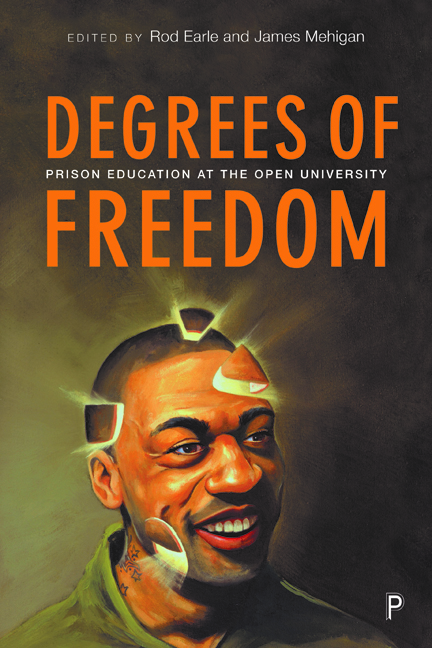Book contents
- Frontmatter
- Dedication
- Contents
- Notes on Contributors
- Acknowledgements
- 1 Openings and Introductions: Education for the Many, Prison for the Few
- 2 From Prisoner to Student
- Vignette 1 Choosing My Journey
- 3 Pioneers and Politics: Open University Journeys in Long Kesh During the Years of Conflict 1972–75
- Vignette 2 Avoiding the Mind-Numbing Vortex of Drivel …
- 4 A University Without Walls
- Vignette 3 Starting a New Chapter
- 5 Open Universities, Close Prisons: Critical Arguments for the Future
- Vignette 4 Out of the Abysmal
- 6 The Light to Fight the Shadows: On Education as Liberation
- 7 From Despair to Hope
- Vignette 5 Making my Commitment
- 8 Straight Up! From HMP to PhD
- 9 From Open University in Prison to Convict Criminology Upon Release: Mind the Gap
- Vignette 6 Message to a Prisoner
- 10 From the School of Hard Knocks to the University of Hard Locks
- 11 Becoming me with The Open University
- Vignette 7 Catching up with Kafka
- 12 From D102 to Paulo Freire: An Irish Journey
- Vignette 8 My Journey, My New Life
- 13 Ex-Prisoners and the Transformative Power of Higher Education
- Vignette 9 Prison Choices: Taking a Degree or Packing Tea?
- 14 What the OU did for me
- Appendix Study with The Open University
- Index
3 - Pioneers and Politics: Open University Journeys in Long Kesh During the Years of Conflict 1972–75
Published online by Cambridge University Press: 11 March 2021
- Frontmatter
- Dedication
- Contents
- Notes on Contributors
- Acknowledgements
- 1 Openings and Introductions: Education for the Many, Prison for the Few
- 2 From Prisoner to Student
- Vignette 1 Choosing My Journey
- 3 Pioneers and Politics: Open University Journeys in Long Kesh During the Years of Conflict 1972–75
- Vignette 2 Avoiding the Mind-Numbing Vortex of Drivel …
- 4 A University Without Walls
- Vignette 3 Starting a New Chapter
- 5 Open Universities, Close Prisons: Critical Arguments for the Future
- Vignette 4 Out of the Abysmal
- 6 The Light to Fight the Shadows: On Education as Liberation
- 7 From Despair to Hope
- Vignette 5 Making my Commitment
- 8 Straight Up! From HMP to PhD
- 9 From Open University in Prison to Convict Criminology Upon Release: Mind the Gap
- Vignette 6 Message to a Prisoner
- 10 From the School of Hard Knocks to the University of Hard Locks
- 11 Becoming me with The Open University
- Vignette 7 Catching up with Kafka
- 12 From D102 to Paulo Freire: An Irish Journey
- Vignette 8 My Journey, My New Life
- 13 Ex-Prisoners and the Transformative Power of Higher Education
- Vignette 9 Prison Choices: Taking a Degree or Packing Tea?
- 14 What the OU did for me
- Appendix Study with The Open University
- Index
Summary
Introduction: unusual beginnings and the scope of this Story
This chapter outlines the events which sparked the educational journeys of hundreds of loyalist and republican Open University (OU) students who were prisoners in British and Irish prisons during the conflict in and about Northern Ireland. While other prisons were also important sites of study, our story centres around the legacy of OU teaching at a particular place and time, namely at the Maze and Long Kesh prison near Belfast in Northern Ireland at the height of the conflict. This story is a testament and witness to the pioneering vision of educationalists and students whose paths crossed in the fight for the right to higher education and prefigures how these stories form part of the wider narrative of the conflict and eventual peace process in Northern Ireland.
This story starts with the escalation of the conflict in Northern Ireland on 9 August 1971, the resolve of two remarkable women, one a social worker and one an OU staff tutor, a donkey in a field and a disused Second World War US Army base. The importance of and connections between those events will be revealed by the narrative content of this chapter which draws on Time to Think, an oral history project started by OU staff in Belfast in 2010. These oral histories are now housed in a digital archive launched in 2019 (Open University, 2019).
The OU involvement in teaching students who were in prison as a result of the conflict in Northern Ireland began at the height of the conflict in 1972 and ended in 2000, when, under the terms of the 1998 Good Friday Agreement, all political prisoners were released. Our aim is to tell one small but significant part of this story – namely how the OU first became involved in education with loyalist and republican prisoners in Long Kesh. It is worth noting that there is a body of literature on the definition, and use of the term ‘political prisoner’ and also a comparison with the term ‘politically motivated prisoner’ (Shirlow and McEvoy, 2008; Shirlow et al, 2010). For the purposes of this chapter the authors just use the terms ‘internee’ and ‘prisoner’.
- Type
- Chapter
- Information
- Degrees of FreedomPrison Education at The Open University, pp. 33 - 46Publisher: Bristol University PressPrint publication year: 2019



